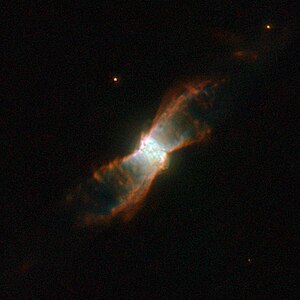NGC 6881
Appearance
| Emission nebula | |
|---|---|
| Planetary nebula | |
 The butterfly-like planetary nebula NGC 6881 is visible here in an image taken by the NASA/ESA Hubble Space Telescope | |
| Observation data: J2000 epoch | |
| Right ascension | 20h 10m 52.45s[1] |
| Declination | +37° 24′ 42.4″[1] |
| Distance | 5200 ± 1600 ly (1600 ± 500[2] pc) |
| Apparent magnitude (V) | 13.700 B [1] |
| Constellation | Cygnus |
| Designations | GSC2 N033220122825, 2MASS J20105244+3724424, PN VV 250, CSI+37-20091, Hen 2-456, PK 074+02 1, PN ARO 108, GCRV 12543, IRAS 20090+3715, PN G074.5+02.1, PN VV' 526 |
NGC 6881 is a planetary nebula, located in the constellation of Cygnus. It is formed of an inner nebula, estimated to be about one fifth of a light-year across, and a symmetrical structure that spreads out about one light-year from one tip to the other. The symmetry could be due to a binary star at the nebula's centre.
References
- ^ a b c "NGC 6881". SIMBAD. Centre de données astronomiques de Strasbourg. Retrieved 12 March 2012.
- ^ Guzmán-Ramírez, Lizette; Gómez, Yolanda; Loinard, Laurent; Tafoya, Daniel (2011). "A distance estimate based on angular expansion for the planetary nebula NGC 6881". Monthly Notices of the Royal Astronomical Society. 414 (4): 3129. arXiv:1103.0231. Bibcode:2011MNRAS.414.3129G. doi:10.1111/j.1365-2966.2011.18609.x. S2CID 118695046.
{{cite journal}}: CS1 maint: unflagged free DOI (link)
External links
 Media related to NGC 6881 at Wikimedia Commons
Media related to NGC 6881 at Wikimedia Commons
